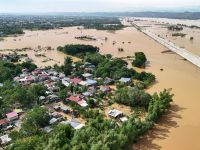Charity organizations in Saudi Arabia last week denied any involvement in funding extremist groups, after the Saudi government announced that it would take action to prevent mishandling of funds raised by the charities.
Adnan Basha, Secretary-General of the International Islamic Relief Organization (IIRO), told Okaz newspaper that his group had been maintaining strict auditing measures to make sure aid money reached its intended destination.
All the organization’s transactions abroad have been carried out through banks in Saudi Arabia and overseas, and assistance is provided through a three-tier monitoring process, Basha said. The IIRO, its offices and affiliates have annual budgets, which are approved by the board of directors as well as Saudi embassies and authorized agencies in the relevant countries.
Local and international legal auditors audit the budgets as well as all financial activities in and out of the Saudi Kingdom. This process applies to the organization’s offices and affiliates abroad, Basha conveyed.
The Secretary-General of the World Assembly of Muslim Youth (WAMY), Mane Al-Johani, criticized the Western media reports against Islamic charities, saying Al-Bir charity which appeared on a terror funding list had stopped its operations five years ago. "Enemies of Islamic work", are not happy with the charities’ achievements and are obviously plotting against them, he accused.
Meanwhile, a Saudi official said on Tuesday that Saudi Arabia would "take every possible action in accordance with relevant international resolutions to ensure that charity works are not misused for illegal purposes."
The statement followed allegations of ties between workers in overseas branches or offices of several Saudi charities and a number of bodies suspected of bankrolling terrorism.
The United States has submitted to the Saudi capital of Riyadh eight lists containing 168 names of individuals and groups suspected of funding terrorism.
Saudi charities have not been a cause of concern regarding the funding of terrorist activities due to the fact that "they are well regulated by the government through the ministry of labor and social affairs," a Western diplomat acknowledged.
The general supervisor of non-governmental organizations in the Kingdom, Daifallah Al-Balwi, has said the charities collected SR1 billion last year. Their sources are from donations made by businessmen and charity members, charity work, zakah and returns on investments, Balwi said.
The money is used for welfare projects, including medical treatment, housing and other services in addition to direct help inside and outside the Saudi Kingdom. Saudi charities have offices and representatives in an estimated 55 different countries around the world and have in the past two decades contributed millions of dollars in aid to Palestinians, Bosnians, Afghans and others.
Last week, Al-Riyadh daily slammed attempts to discredit Islamic charities. "We know that the ongoing war after September 11 targets the Islamic world, from the Indonesian islands to the jungles of Nigeria ... It is an attempt to strip this world of its humanitarian values in the name of fighting terror," the paper’s editorial stated.
"The West is not entitled to issue certificates of good conduct while it has caused desperation in the world," Al-Riyadh wrote. "It is true we have extremists and those backing them, but they do not control Arab and Islamic governments and similar cases exist in Western societies too." (Albawaba.com)







